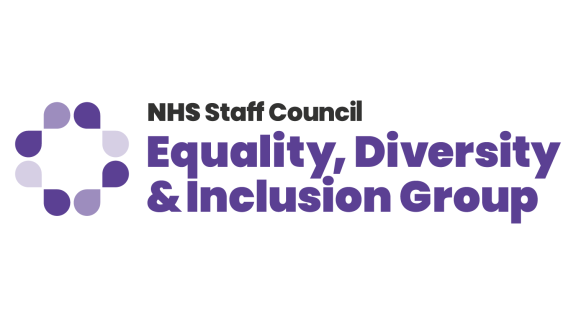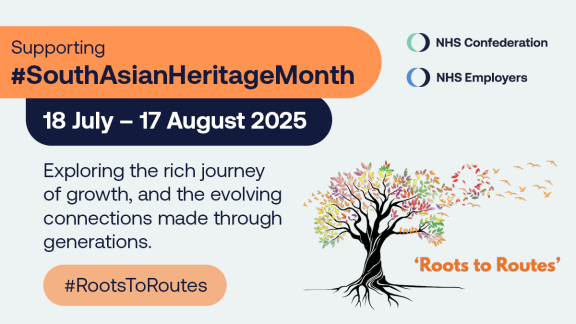Key points
Sections of the NHS Terms and Conditions Handbook, if applied incorrectly, may increase pay gaps.
Pay on promotion, progression, unsocial hours payments, recruitment and retention premia can all widen pay gaps.
This guidance and other guidance and FAQs published by the NHS Staff Council can ensure correct application to prevent exacerbation of pay gaps.

About the Equality, Diversity and Inclusion Group
EDIG (Equality, Diversity and Inclusion Group) is a technical subgroup of the NHS Staff Council. The NHS Staff Council has responsibility for the Agenda for Change (AfC) pay system and has representatives from both employers and trade unions. EDIG provides scrutiny in terms of supporting NHS compliance with statutory legislation, promoting an inclusive workforce and working environment and providing guidance for NHS employers and staff on good practice.
Introduction
In 2023, NHS England published its equality, diversity and inclusion (EDI) improvement plan. The plan included six high impact actions for organisations across the NHS to take to improve equality, diversity and inclusion. One of these high impact actions is to develop and implement an improvement plan to eliminate gender, ethnicity and disability pay gaps.
EDIG has reviewed the NHS Terms and Conditions of Service Handbook (the Handbook) to identify some areas which, if applied incorrectly, may increase pay gaps. It has also highlighted issues that go beyond the application of the Handbook and where possible, flagged interconnected Staff Council work and useful resources.
Several Handbook sections include a requirement for local equality assessments, review and monitoring of implementation. There is no national data to enable us to review how far this happens in practice. EDIG is aware that this has been raised through the Staff Council flexible working group but notes this also applies in various other sections. EDIG produced supporting guidance to accompany the new Section 33 (Balancing work and personal life) in 2021.
The NHS Job Evaluation Scheme underpins the Agenda for Change pay structure and ensures equal pay for work of equal value. Equal pay and pay gaps are not the same; pay gaps are more about equality of opportunity but equal pay is still relevant to pay gaps. At the time of producing this guidance, the NHS Staff Council Job Evaluation Group has recently reviewed the suite of nursing and midwifery profiles and job evaluation forms as part of the non-pay work from the 2023 pay deal. EDIG notes the guidance on the difference between the gender pay gap and equal pay produced by the Equality and Human Rights Commission (EHCR).
Pay on promotion
The Handbook requires that starting salaries on promotion should produce an increase in earnings. Salary is made up of basic pay, unsocial hours payment and long-term recruitment and retention premiums but because of Agenda for Change structural issues, promotion to a higher pay band may not always produce the requisite increase.
If the salary on promotion does not result in an increase in earnings, then the previous salary should be maintained until the combination of basic pay, unsocial hours payment and/or recruitment and retention premium in the new pay band does produce a higher salary. The interaction of unsocial hours and recruitment and retention premiums is not always applied consistently, and guidance was produced following changes to the Handbook in April 2021 which provided scenarios and frequently asked questions to support employers.
EDIG recommends that the guidance and FAQs are regularly promoted within NHS organisations and brought to the attention of recruiting managers whenever a post becomes vacant.
Unsocial hours payments
The NHS delivers patient services around the clock. Staff who work evenings, at night, over weekends and on public holidays are entitled to enhanced pay for working unsocial hours.
Women (who are more likely to have caring responsibilities than men) and disabled staff may find working unsocial hours more challenging. Access to set working hours, term-time working or annualised hours, for example, could provide more opportunities for those staff to work unsocial hours and enhance their pay.
The EHRC recognised that access to flexible working would be a factor in reducing pay gaps.
EDIG would therefore recommend that managers take a supportive enabling approach to unsocial hours working.
Recruitment and retention premia
Recruitment and retention premia are supplementary payments over and above the pay that a post holder receives by virtue of their position on their pay band, any high-cost area supplements, or any payments for unsocial hours or on-call cover. Recruitment and retention premia apply to posts; they do not apply to the post holder.
The principles consistent with equal pay for work of equal value apply to recruitment and retention premia. Organisations must therefore avoid the trap of awarding premia to the person, not the post. Towards this end, local recruitment and retention premia policies and processes should be subject to an Equality Impact Assessment.
EDIG recommends that NHS organisations must ensure an equality impact assessment is carried out every time there is a proposal to pay a recruitment or retention premium.
Career progression
Evidence shows that in recruitment situations, women and black and ethnic minority colleagues are more likely to look at the criteria in a job description and decide not to apply for a role. Their experience tells them they are more likely to be expected to perform to a higher standard than white or male colleagues and Workforce Race Equality Standard (WRES) data published in 2024 shows that white staff are more likely to access non-mandatory training and continuous professional development.
Access to opportunities such as acting up, secondments, courses and involvement in projects need fair access and selection processes.
EDIG recommends that before managers are involved in any recruitment exercise, they should be trained in unbiased and non-discriminatory selection, and this is included as standard in any local recruitment training.
Those with caring responsibilities for children or dependent adults are less likely to be able to undertake personal or professional development during ‘normal’ office hours. Similarly, disabled colleagues might be less able to commit to set days and times when they cannot predict what their levels of resilience and ability might be at any given time.
EDIG recommends that organisations offer more flexible training and development opportunities.
Pay progression
The Agenda for Change pay progression framework is underpinned by local appraisal policies that deliver the mandatory annual appraisal process. It is intended to ensure that within each pay band, staff have the appropriate knowledge and skills they need to carry out their roles. Local appraisal policies should be agreed in partnership with trade unions and may cover issues such as development opportunities and organisational values and behaviours.



